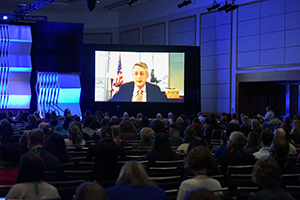
By Michelle Mott, AACRAO Associate Director of Government Relations and Communications
U.S. Undersecretary James Kvaal addressed AACRAO members virtually at the Annual Meeting in Portland, highlighting the difficulty and importance of the work association does, particularly amid the pandemic.
The pandemic challenged us personally and professionally,” the undersecretary stated. “And turned higher ed upside down.
Kvaal, former president of the Institute for College Access & Success (TICAS), a research and advocacy nonprofit dedicated to affordability and equity in higher education, pointed to the drop in college enrollment nationally, as well as the decrease in financial aid applications. This “missing million could leave a permanent dent in attainment” and the long-term trickle effect, particularly for underserved students is tragic, he added.
Once we emerge from the pandemic, we cannot return to the way things were done in 2019, Kvaal noted. This is an opportunity to rethink and “build back better” by working to keep high school students on track, provide more flexible schedules for adult learners, use data to drive improvement, create community for students, and build a new culture to help until all students succeed.
The undersecretary highlighted the Biden administration’s proposed investments in colleges that are historically underfunded, including community colleges, historically black colleges and universities (HBCUs), and other minority-serving institutions. He noted specific concerns regarding the current student debt system and the work that the administration has done to alleviate some of that burden through extending the pandemic pause on student loan and interest payments, discharging the debts of disabled borrowers and other students through the overhaul of the Public Service Loan Forgiveness (PSLF) program, as well as the forthcoming overhaul of income-driven repayment plans.
We want to “confer prestige” on institutions that promote inclusivity, affordability, and economic mobility and opportunity for students. “This is what’s important,” Kvaal concluded in his formal comments.
A Lively Q&A
Undersecretary Kvaal also fielded comments from AACRAO Executive Director Melanie Gottlieb and the audience at large. Topics touched on the importance of building better and stronger transfer student systems, as well as the work the association is doing around the issue of transcript withholding. Kvaal commended AACRAO’s thoughtful and careful recommendations on navigating the complexities of the issue, which he called a “stumbling block for many students.” He encouraged institutions to use COVID relief funds to forgive some of these debts as part of the continued effort to put the needs of students first.
Several AACRAO members pushed the department further with questions on how the administration intends to deal with the country's current student debt crisis, calling on the president to use executive authority to enact widespread student loan debt forgiveness.
Kvaal agreed that the current student debt system is broken and discussed several Biden administration initiatives to impact college affordability, including plans to create a new income-driven repayment program with substantially lower monthly payments; budget proposals to double the Pell Grant by 2029; and increase investments in MSIs, TRIO, and GEAR Up, and additional funds to help student with child care needs.
He said that the administration is examining whether it has the legal authority to discharge large amounts of student loan debt, but did point out the work that his agency has done to cancel loans where it can, including PSLF and disability discharges, as well as borrower defense to repayment disbursements. Kvaal noted that the Biden administration has likely done more to forgive student loans than any other president, and likely all previous presidents put together.
AACRAO members also pressed the undersecretary on the recent 85/15 reporting rule reset and issues related to the ArmyIgnitED rollout. Kvaal stated that his agency does work with the U.S. Departments of Veterans Affairs (VA) and Defense (DOD) on certain reentry issues, but does not currently work on those particular issues, as they are outside his general jurisdiction. However, he took note of members’ frustrations with the implementation processes and committed to following up with VA and DOD officials.
Additionally, attendees posed a number of questions with ties to some of the Education Department’s forthcoming rulemaking, although Kvaal was unable to provide detailed answers until formal proposed new rules are published. However, he did hint that the administration may have plans to include additional protections for LGBTQ+ students in its upcoming Title IX rule rewrite. Kvaal also appeared open to recommendations AACRAO members suggested regarding Satisfactory Academic Progress benchmark barrier issues for returning learners, more inclusive demographic questions for federal data collection and sharing, and flexibilities for micro- and macro-credentials in relation to gainful employment regulations.
The Education Department plans to release draft new rules on a wide range of higher education topics in the coming weeks. Kvaal issued a strong call for stakeholder feedback throughout that process. AACRAO has been engaged with the department and the rulemaking committees tasked with rewriting the regulations and intends to provide comments on the agency’s proposed rules to ensure that our members’ concerns are heard.
Interested in staying up-to-date on higher education policy news and changes? Subscribe to AACRAO Transcript.